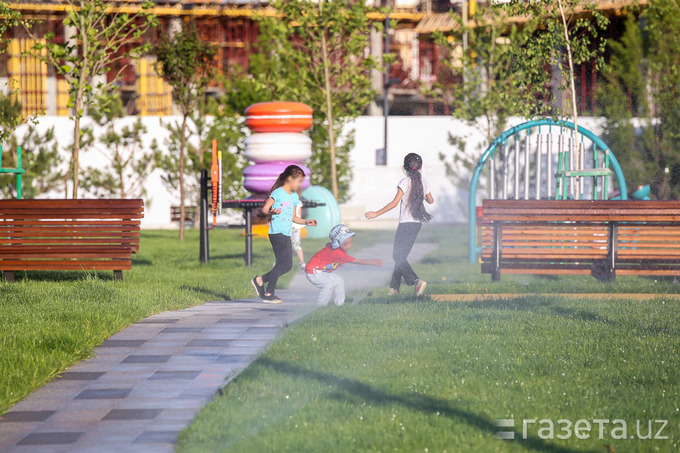By Antonia Luedeke, Chief of Child Protection, UNICEF Uzbekistan
Punishment of a child as a means of discipline is something as old as humanity. Across the world, in various communities, in the homes, in schools, parents and families have always sought ways of inculcating values and discipline to the next generation. Methods of instilling discipline are as old as time and are often a part of community’s sacred culture.
In UNICEF we know that new sacred positive cultures can be created; cultures in education, in immunizing our children and in stopping harmful practices like child marriages for instance. While often communities are very defensive about methods of socialization that seemingly have worked for generations, we know that they can be convinced for greater good.
Today we make a case against corporal punishment, which is contentious area that has solicited strong responses from parents.
Corporal punishment, which includes any physical act — such as hitting, slapping, or spanking — intended to cause a child pain or discomfort for disciplinary purposes, remains widespread despite mounting evidence against its efficacy and safety.
Evidence is showing us as in numerous fields, like health, education and many others that the way our forefathers might have brought us up and punished might be flawed and emerging evidence is begging parents, families and communities to discipline and punish children differently and move away from physical punishment.
Research across diverse socio-cultural backgrounds has consistently demonstrated that corporal punishment may lead to increased child aggression, antisocial behavior, physical injuries, and mental health issues.
While change is coming in most countries — 65 states have taken legislative steps to ban corporal punishment in homes, with many extending these protections to include educational environments and other settings where children are present — in the face of such compelling evidence, change is not at the pace that UNICEF wants and children deserve.
It is against this background that April 30 marks the International Day to End Corporal Punishment of Children, a day set aside globally to challenge a deeply ingrained practice that affects millions.
This day is critical for reflection upon traditional disciplinary methods and to champion non-violent approaches that safeguard the wellbeing of children in all settings, including the home.
The persistence of corporal punishment, supported by longstanding cultural norms, continues to present a formidable challenge. For example, recent statistics from Uzbekistan, as reported in the Multiple Indicator Cluster Surveys (MICS) 2021−2022, show that 62% of children 1−14 years of age experience some form of violent discipline. This alarming figure is not unique to Uzbekistan but mirrors a global issue that demands a culturally sensitive yet firm approach to child protection and discipline.
At UNICEF, we advocate for a shift towards non-violent parenting and educational methods that respect children’s dignity. This involves promoting discipline strategies that foster self-control and respect without violence, supporting the global shift away from physical punishment.
In countries like Uzbekistan, where strong community and family structures provide a robust framework for societal norms, there is a unique opportunity to leverage these institutions to effect change. Makhallas, among others, can serve as effective platforms for promoting non-violent discipline. These local networks are ideally positioned to distribute educational materials and host workshops aimed at equipping caregivers and educators with the skills to implement alternative positive disciplinary techniques.
Supporting caregivers and educators is crucial to this endeavor. They require continuous access to training and resources that offer alternative methods of discipline, highlighting the long-term benefits of these approaches. Such educational programmes should be widely available through community centres, schools, and healthcare facilities, tailored to meet the specific needs of the community while aligning with global child protection standards.
Additionally, robust policy reforms are necessary to provide a solid legal framework against corporal punishment. Legislation should cover all settings where children learn and grow, ensuring a consistent and clear message against the use of physical punishment. Uzbekistan expressed its commitment to prohibiting all corporal punishment of children by clearly accepting the recommendations to do so made during the Universal Periodic Review of Uzbekistan in 2018.
Whereas corporal punishment is unlawful as a disciplinary measure in penal institutions and as a sentence for crime, legal prohibition is still to be achieved in the home, alternative care settings, day care and schools. Legislation must be accompanied by effective enforcement mechanisms and widespread educational campaigns that help transform societal attitudes towards discipline and encourage the adoption of non-violent positive disciplining methods.
As we observe this International Day to End Corporal Punishment, let’s reaffirm our commitment to protecting children’s rights in every arena. This day should catalyze global and local actions, fostering ongoing dialogue and cooperation across all levels of society, from policymakers to educators to families. By doing so, we not only protect children but also help cultivate future generations who understand and embrace respectful and non-violent interactions.
In conclusion, the challenge of ending corporal punishment is both a matter of changing laws and shifting societal norms. By advocating for and implementing non-violent methods across all child-related environments, we ensure that children receive consistent messages about respect and discipline that do not involve violence. This approach is essential for the physical, emotional, and psychological health of children and for the development of societies that value and practice respect and dignity for all.
This comprehensive strategy is about more than just eliminating a harmful practice; it’s about redefining how we nurture and guide our children towards becoming healthy, capable adults. With collective efforts and shared commitments, we can forge a path to a more nurturing and respectful world for all children.





